Father and son live large in a tiny home nestled on a Tai Tapu orchard
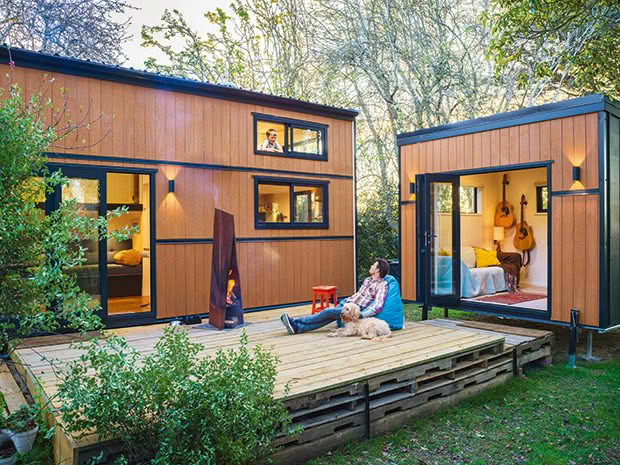
Jonny Kirkpatrick created a deck from recycled pallets, connecting his first tiny home to a new pod used as a media room. “It only cost a few hundred dollars to build the deck, and now it’s given us almost an extra room where we can be outside more.”
Tiny-home living isn’t just for the green-minded. According to a Christchurch dad, it’s the perfect playground for a father and son.
Words: Nicole Barratt Photos: Rachael McKenna
Jonny Kirkpatrick and his seven-year-old son Jack don’t have to go far from home for fresh ingredients. Reach one arm out the window of where they live to find pears; stretch another in the opposite direction for apples. Peaches drop with a thud on the deck as they ripen (eagerly inspected by the pair’s pet chickens).
Such are the perks of parking a tiny home on a century-old orchard in Tai Tapu.
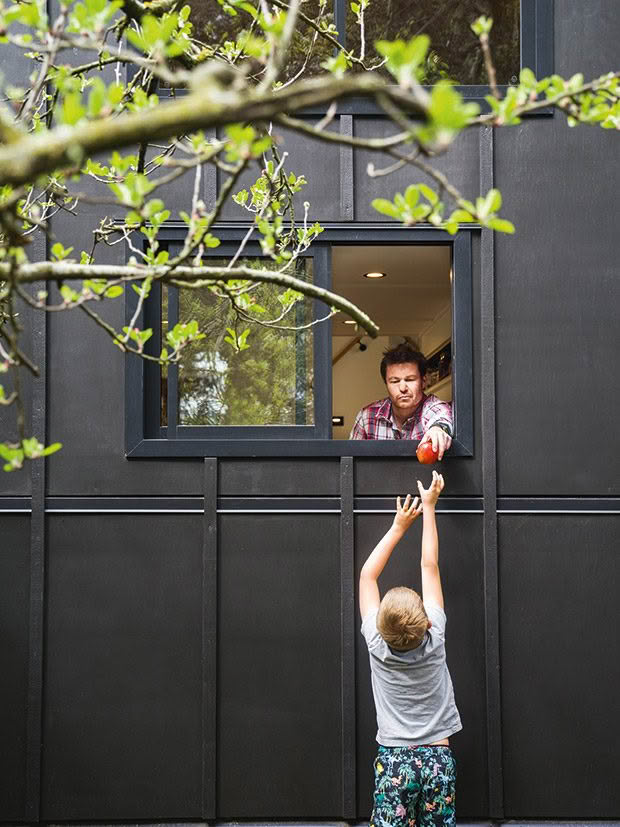
If Jonny can’t see Jack, his son will likely be on his bike exploring the orchard, gathering handfuls of blackberries. Scruff the labraspoodle is bound to be tagging along. “Scruff is 12 and a bit of an old man, and he couldn’t be happier out here.”
The father-son duo’s idyllic rural set-up is a far cry from their previous rental property, a two-bedroom house close to Christchurch’s town centre. “I’d been renting for three years after my marriage ended, and I had this gnawing sensation that I was essentially just paying someone else’s mortgage,” says Jonny.
A conversation with his father in 2020 sparked the idea to try tiny living. “My dad said: ‘Well, do you want to live in a dark and damp house in a not-so-nice part of town mortgaged to the eyeballs for 30 years? Or you could live in a modern little house in a lovely part of the country, mortgage-free in five years.’” Jonny had previously entertained the idea of building a tiny home but was hesitant to sacrifice ‘luxuries’ such as a full-sized shower and kitchen.
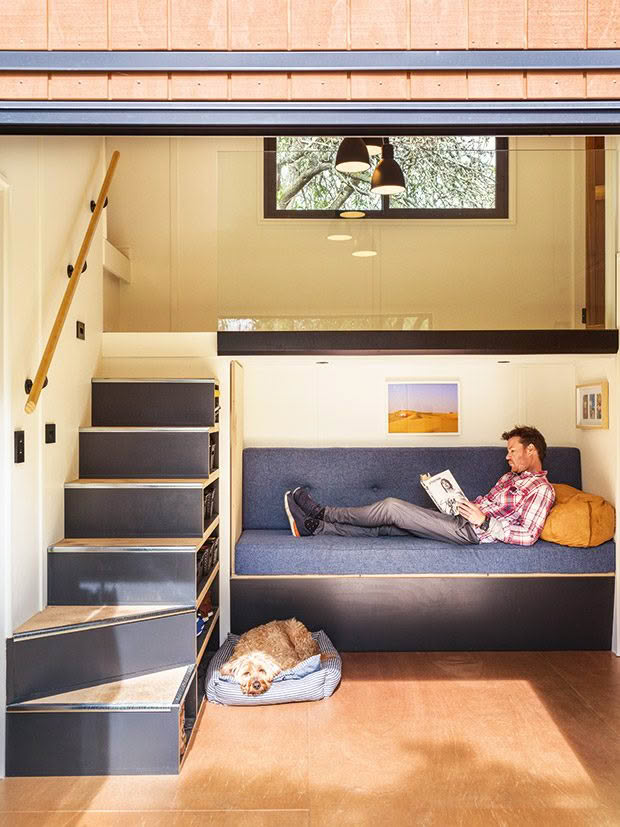
Lack of light or warmth has never been a problem in the duo’s tiny home — light floods in, and it’s been so warm they haven’t yet installed curtains.
However, the chat with his dad — the pandemic as its backdrop — proved to be the encouragement he needed. Jonny’s upbringing in rural North Canterbury featured backyard rugby, wading through creeks and playing in paddocks. “I wanted to give something like that to Jack. He has a taste of suburbia living with his mum when he’s not with me, so to have a home where he could run about and explore was important to me.”
Obtaining finance for the build was tricky. Despite having a significant deposit — more than 20 per cent — banks weren’t keen to loan to Jonny, who was self-employed at the time. “I was working solely in events marketing then, and my work had completely dropped off with Covid-19, so they weren’t enthusiastic about lending to me.” Instead, he took out a loan from a second-tier lender, determined to secure his tiny-house dream.
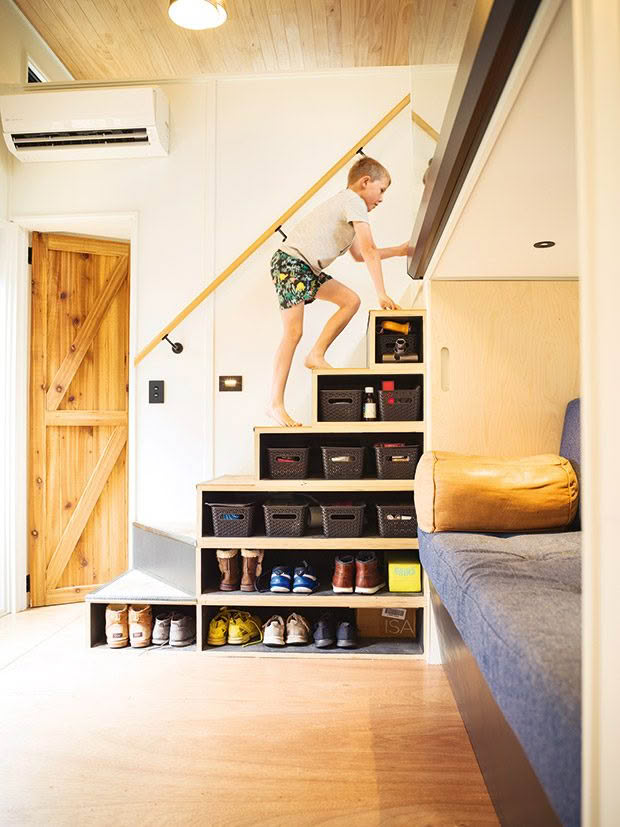
“You can’t get mortgages for tiny homes, so this was a bit intimidating. But it feels like liberation now as I don’t have a massive home loan,” says Jonny. He watched plenty of videos on tiny homes to narrow down what he wanted. “We didn’t want to waste space, so we incorporated storage into the staircase”.
“Naively, I thought it would be a bit like building a caravan, but I quickly learned it was quite a bit more than that.” Jonny sought the help of local builder Hamish Curtis, an expert kitchen joiner who had branched into building tiny homes.
“I didn’t want a cookie-cutter tiny home. Quite a few look the same now, and I wanted something that would be liveable. It was a mix of my imagination and what Hamish could build that created the space.” Jonny didn’t want Jack scrambling up any ladders in the home, so Hamish created a staircase leading to two loft bedrooms, connected by a walkway and glass bannister.
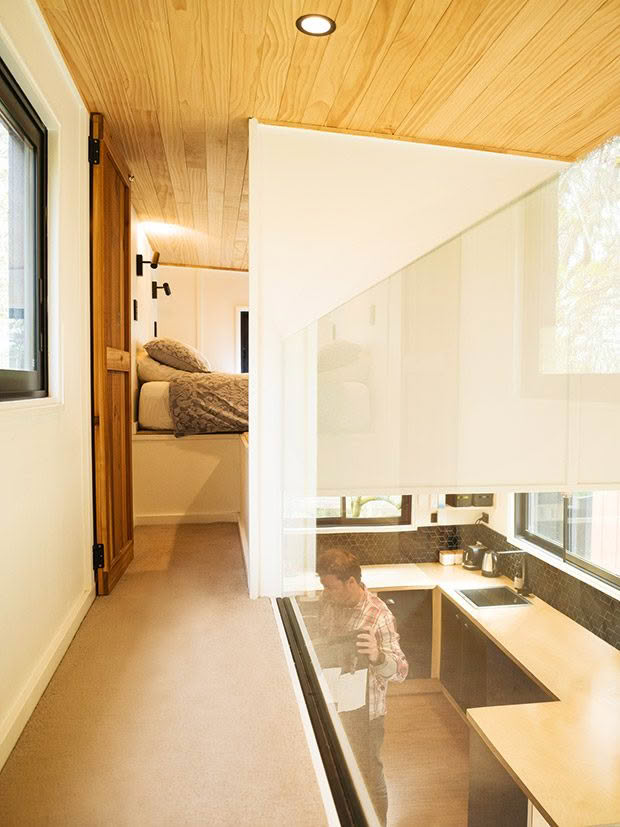
Jonny and Jack’s rooms are on opposite sides of the loft, separated by the glass bannister. “Scruff does think the king-size bed in my bedroom is his,” Jonny says.
“I was adamant that we’d have a decent-sized kitchen — that was also top of the list.” Jonny is a keen cook, regularly whipping up flavour-packed gluten-free stir-fries, pasta and baked treats. If anyone peered through the window to his kitted-out kitchen (complete with a fridge-freezer and breakfast bar), no one would know it was housed in an 8.2-metre x 3-metre home.
“I think people think of tiny homes as being quite poky, but you just need to prioritize space for what you enjoy — for us, that was the kitchen.”
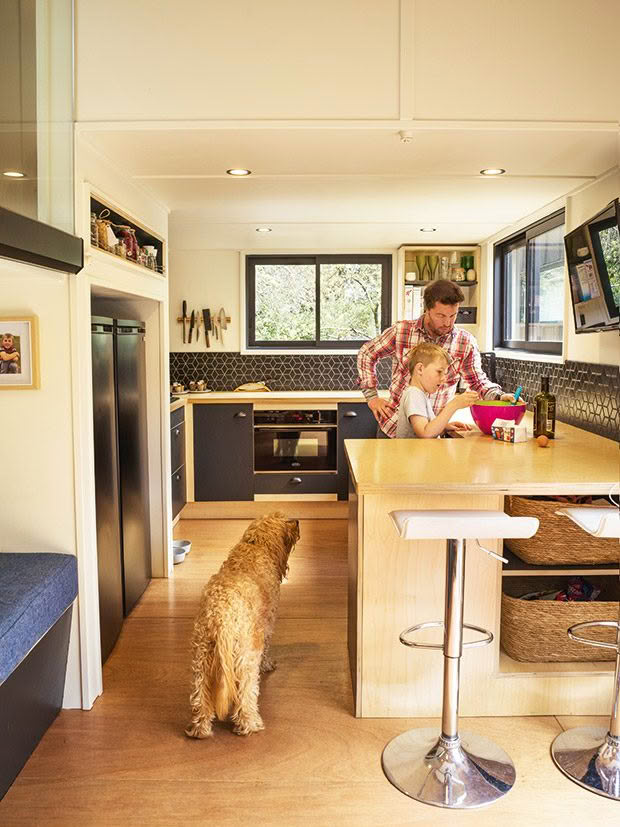
Jack likes to help Jonny in the kitchen, which has plenty of space for them. “It’s the second-biggest kitchen I’ve ever had in a home, which is amazing, considering this is a tiny house,” says Jonny. “I think I surprised myself living here, not knowing how I’d go, but I still love it nearly a year later.”
Cooking gluten-free has been a journey, and plenty of lessons have been learned (such as discovering quinoa pasta is often slimy, and xanthan gum is a lifesaver in baking). Jonny’s grandfather died young of bowel cancer, suspected to be linked to undiagnosed coeliac disease. “Mum was diagnosed 20 years ago, and my brother 12 years ago. For peace of mind, I went and got tested just before Jack was born, and it came back saying I was a full-blown coeliac too.”
Suspecting Jack carried the same gene, everything in the tiny home is made gluten-free. “It’s not an easy journey, to be fair; it’s a bit of change. But it pushes you to get creative, which is why we needed a good kitchen.”
Jack will happily explore the property and return with handfuls of blackberries from the garden while Dad cooks.
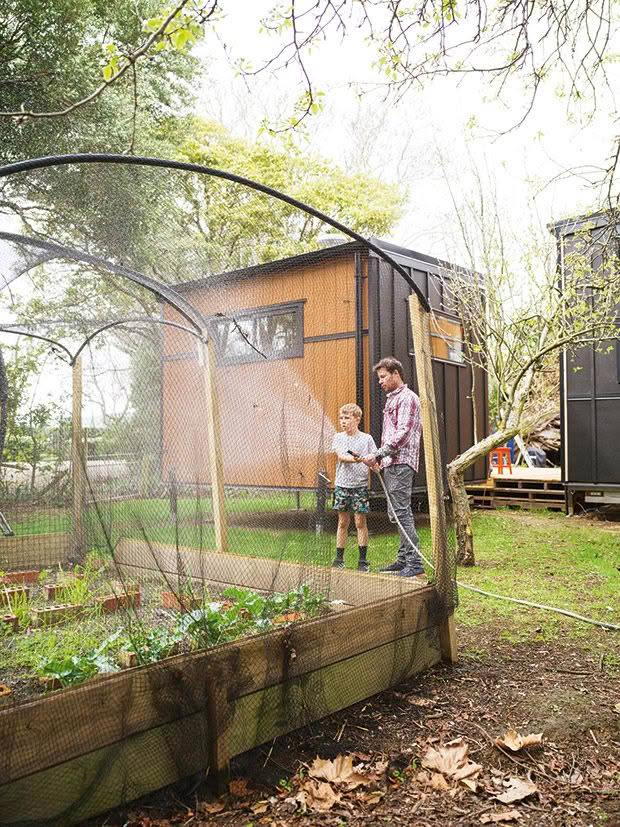
The pair planted a veggie garden in May with the help of Jonny’s father. “We’ve been trying to get our green fingers going. We cleaned out our gutters at the same time, pruned trees and installed some blinds in the pod”.
Their tiny-home project stalled repeatedly, hampered by lockdowns, supply delays and price increases. “Building in the middle of a pandemic wasn’t easy. We signed a 16-week build contract in May 2021 but didn’t move into the house until December.”
A five-week stint living at his parent’s Christchurch home turned into four months. “Mum passed away with cancer not long before, so I think it was lovely for Dad to have us there with him. But we were doing a 50-minute drive to Jack’s primary every day each way in traffic, so it was hard at times.”
Thankfully, finding land to park their new home on was more straightforward — a post on the local Tai Tapu Facebook page connected Jonny to the owners of an old orchard. “It’s a lovely, sheltered space, with the main house just up from us. We brought the tiny home in on a hired truck and spun it into position. I’d heard stories about people having to cut down trees and swing their houses over fence lines, so we were grateful the install was relatively simple.”
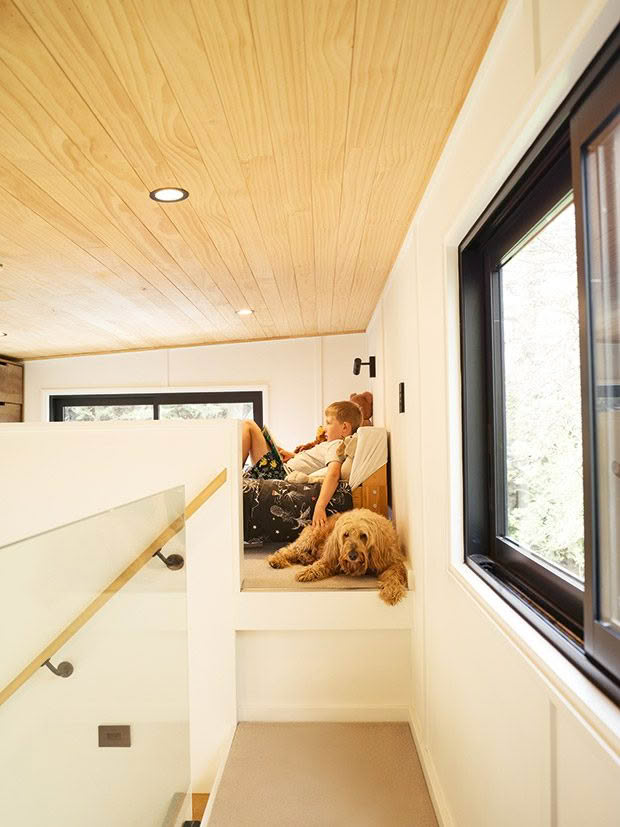
Jack’s loft bedroom overlooks the orchard, with rolling Canterbury hills in the distance. “He has the pick of the views in the house, I’m not sure he fully appreciates it, but I’m sure he will in time.” What he does love is the freedom and tranquillity at Dad’s house. “We were sitting outside a while ago and turned to me and said, ‘We chose a good spot for our house; it’s so peaceful.’”
Add-ons to the home since its installation have included a separate tiny pod room for watching movies and playing the guitar and a deck made of recycled pallets connecting the two spaces. An outdoor fireplace is the most recent addition, in memory of Jonny’s mum.
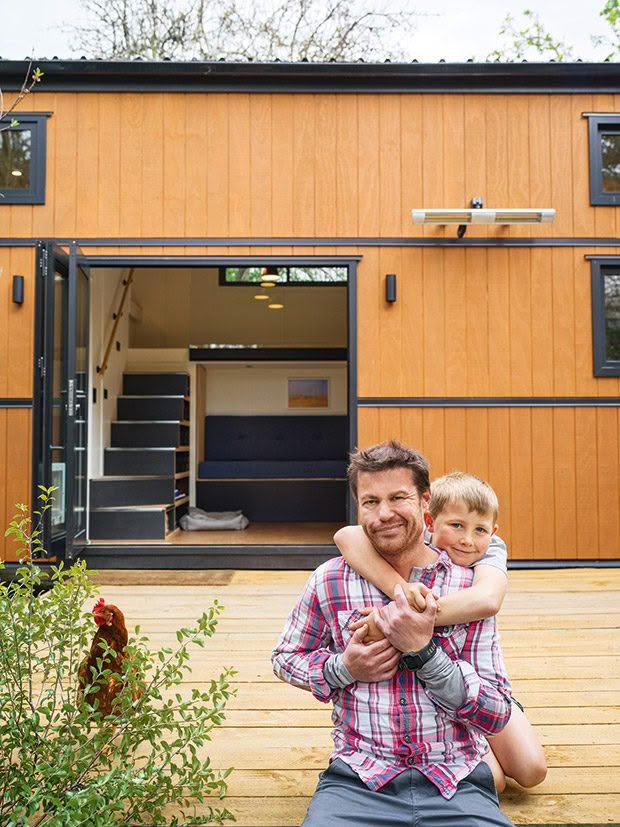
“Jack said to me sitting by the fire once, ‘Can we do this more often, Dad?’ I think that’s when you realize kids just want to spend time with you. It’s what living here has allowed me to do.”
Jonny says he’s certainly no eco-warrior or minimalist, but the reasons for people choosing to live tiny will always vary. “More of us working professionals are seeing it as an option — you don’t need to be a protestor or at the fringes of society to live like this. It’s taught me what’s important. Creating something that’s mine without all the clutter means Jack and I can focus on living a great life.”
THINKING BIGGER
The total cost of Jonny and Jack’s home (including the extra pod and deck) was $200,000, which Jonny says he’ll have paid off in five years. “We nearly didn’t do the extra pod, but I’m glad we did. Having that extra space to watch a movie or go and play the guitar has created more of a home.” A shipping container acts as their shed, housing what wouldn’t fit in the tiny house, such as skis, bikes and tools.
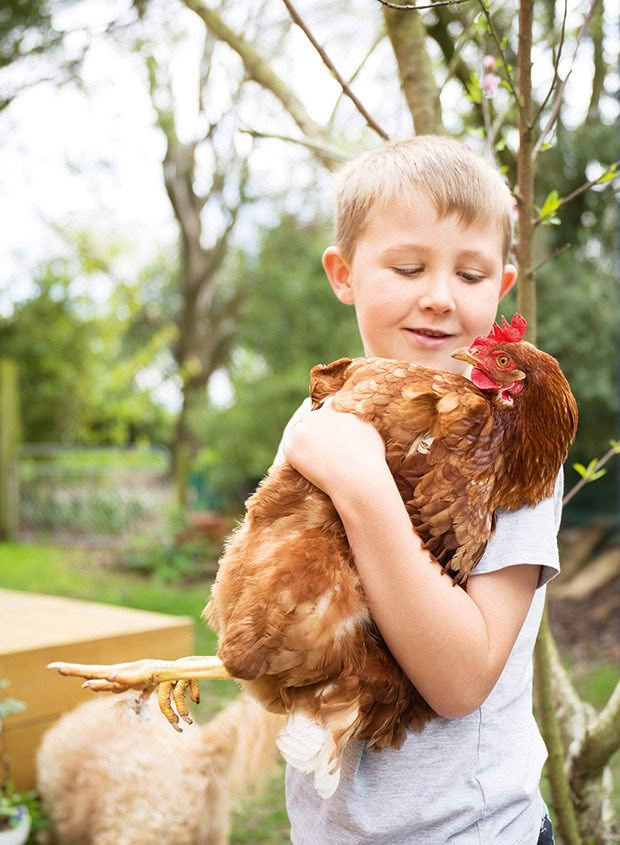
There’s no shortage of eggs, thanks to chickens Princess Leia and Queen Amidala. Often the chooks stand and peer in at the door of the boys’ tiny home, wanting to get in on the cooking action in the kitchen.
The recycled-pallet deck is a favourite suntrap for pets Scruff the dog and chickens Princess Leia and Her Eggcellence Queen Amidala. “Jack is a bit of a Star Wars fan, so he named them. I wanted Cluck Norris, but he didn’t know who Chuck Norris was. I can’t tell the pair apart, but Jack reckons he can.” The happy hens are laying more eggs than Jonny and Jack can get through. Thankfully, for Jonny, who is a coeliac, pavlova is gluten-free.
JONNY’S TIPS FOR TINY LIVING
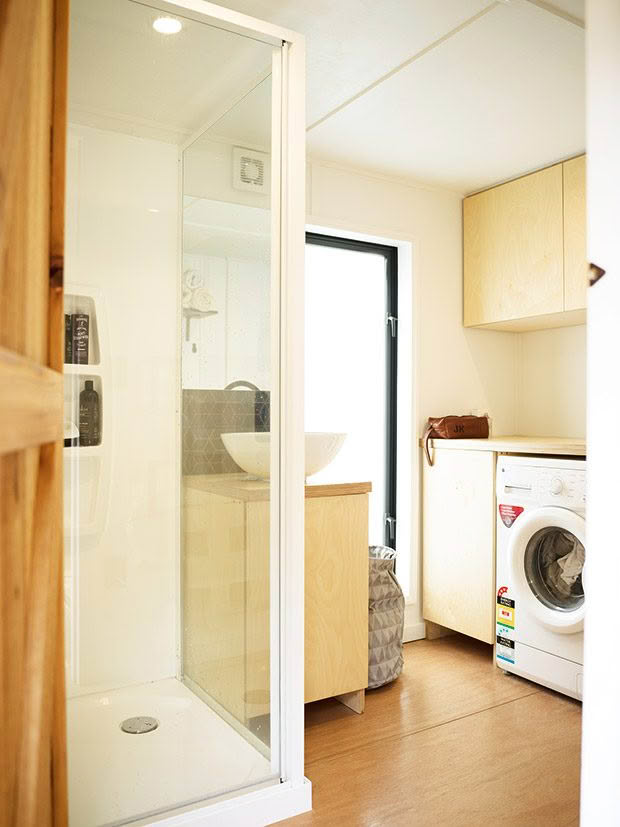
“We have an incinerating toilet in our bathroom. A composting toilet can be pretty intimidating for people, but this can go straight in the compost and is easy to use”.
Prioritize space for what you love: “Think about the areas you enjoy and spend a lot of time in and maximize these in your tiny house (e.g, the kitchen, bathroom or bedroom).”
Invest in decent cleaning products: “Just because it’s small doesn’t mean it doesn’t get dirty! It gets dirtier as there is less space for the dirt to spread around, so a good vacuum cleaner and broom are a must. I’m not a neat freak at all, but you do have to keep an eye on mess and clutter in a small space. Chuck in a labraspoodle, and the dirt builds up quickly.”
Do your research: “Look at all the options online in terms of various designs and storage options. Don’t just settle on the first one you see and like. There are so many great ideas and options out there.”
Consider blinds: “Choose blinds over curtains. Curtains can sometimes make the space feel smaller/more enclosed. They are warmer, but generally, a good tiny house is easy to heat.”
Declutter early on: “Start planning your reduction of stuff before moving into your place. You’ll be amazed how much you don’t miss once you haven’t used it for a while.”
Follow Jonny and Jack’s adventures on Instagram at @thegftinyhouse
Love this story? Subscribe now!
 This article first appeared in NZ Life & Leisure Magazine.
This article first appeared in NZ Life & Leisure Magazine.
